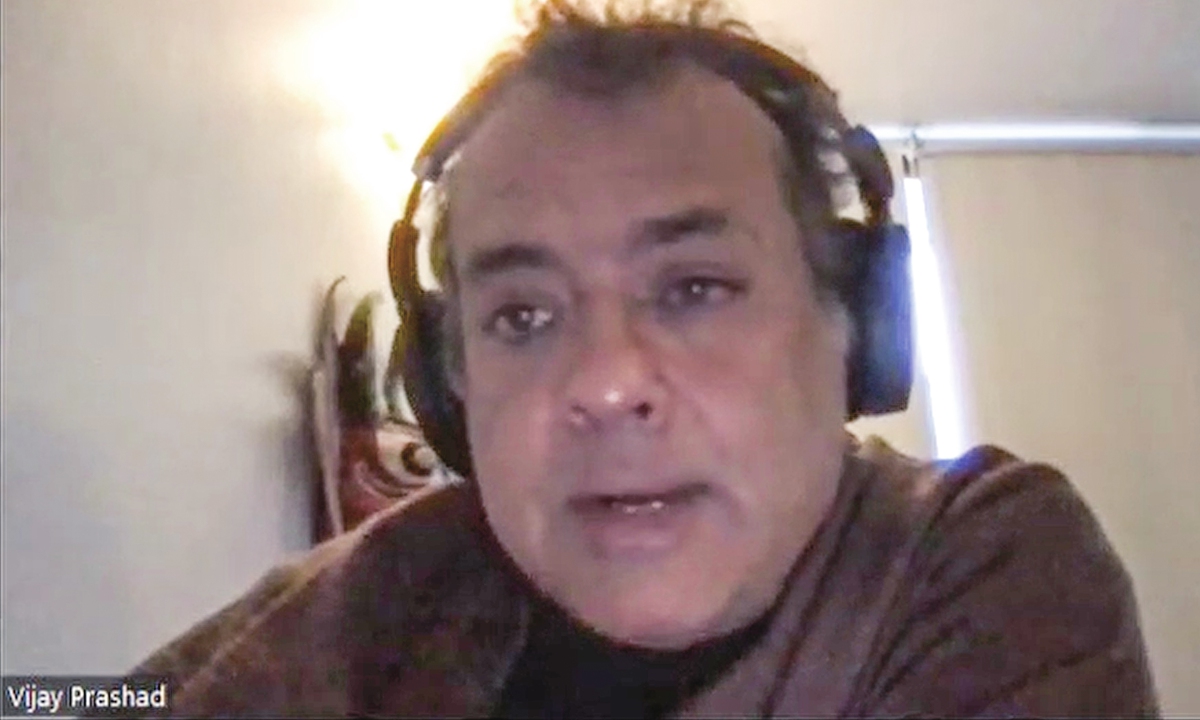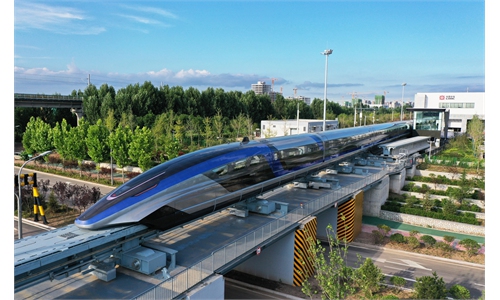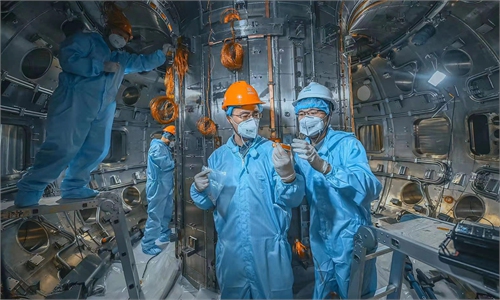China’s role in building global democracy a shining light for developing countries: Indian scholar

Photo: VCG
Editor's Note:For the Chinese people, the past decade has been epic and inspirational. The country, under the leadership of the Communist Party of China (CPC) with Xi Jinping at its core, has made great endeavors in boosting its economy, deepening reforms, improving the rights of its people and acting as a responsible power globally.
If using one word to describe China's changes over the past decade, it would be "experiment," said Indian Marxist intellectual Vijay Prashad (Prashad), executive director of Tricontinental: Institute for Social Research. In an interview with Global Times (GT) reporters Lu Yuanzhi and Bai Yunyi, he said "it's the highest ethic of the modern world to eradicate poverty," and what China has done in this regard is "incredible."
This is the 14th article of the series about this special decade.
GT: If you are asked to use one word to describe China's changes over the past decade, which word would you choose and why?
Prashad: It would most likely be the word, experiment, because I think one of the features of Chinese socialism since 1949 has been to experiment with attaining certain goals, like eradicating hunger and poverty, building the dignity of the people and so on.
Since 1949, the Chinese people have gone through a lot of ups and downs. And in all the ups and downs, the goal has always been to establish socialism.
I think over the past 10 years, there have been a lot of very interesting experiments. The abolishment of absolute poverty is an immense success. I wouldn't say that a country like China has attained perfection, but certain things have certainly been achieved. Ecological progress has been dramatic. I'm always surprised to see the new technologies when I am in China, especially the high-speed rail. There have been some real advances.
GT: In a previous interview with Global Times, you said that you are paying great attention to China's poverty eradication. Why do you focus on it?
Prashard: I think that it's the highest ethic of the modern world to eradicate poverty, which means eradicating hunger, illiteracy and so on. It is the highest moral standing of a government. Mahatma Gandhi, the great Indian, said that the test of orderliness in a country is not the number of millionaires it owns, but the absence of starvation among its masses. We can update that and say a country shouldn't be judged by the number of billionaires it has, but by the absence of poverty in the country.
I've been writing about hunger for years, covering stories of hunger all around the world. I think it's a very important issue, because I find it hard to be a person when people are hungry.
It's incredible what China has done. Is it possible for it to be replicated? Of course. But it's not just a question of following the principles. You got to have a state that is committed to eradicating poverty as a primary goal.

Vijay Prashad Photo: Screenshot
GT: In recent years, the West's demonization of China, especially China's social and political systems, tends to become increasingly severe. What has triggered such a phenomenon?Prashad: Since former US president Richard Nixon visited Beijing till perhaps the presidency of Barack Obama, China was actually viewed favorably in the US. The US also viewed Chinese production in Shenzhen and other places as being fundamental to the international industrial production chains.
What changed? In my opinion, two things happened. First, Chinese technological developments threatened the technological power of Western companies. For instance, Huawei started to make phones. If Huawei makes phones that are as good as Western phones, such as Apple, and if they're cheaper, they certainly threaten the market of Western companies. Chinese firms are producing as good, if not better technology, as that in the West and at a cheaper price. This is a great market threat. The West attempts to roll back China's technological developments.
The US government started to say Huawei might threaten its security. But there was no proof. That was one genuine threat to Western capital - China had actually attained a kind of technological parity or near parity with Western technological developments.
Secondly, especially after the financial crisis of 2007-08, China and Europe began to enhance cooperation, and many Central and Eastern Europe countries signed the Memorandum of Understanding on the Belt and Road Initiative and Italy also joined the Belt and Road Initiative. For these two reasons: advances in Chinese technology and the historical integration of Eurasia, the US has accelerated a pressure campaign against China.
GT: The West has also fabricated the "China threat theory," attempting to isolate China on a global scale. Will the West achieve its intent?
Prashad: I think that it's a very serious question.
First, I think China needs to acknowledge that in terms of the information struggle, it is much weaker than the West. For instance, Western media companies saturate news coverage in much of the third world. It's through Reuters, Associated Press, CNN, Fox News and so on. A lot of their ideas are refracted through world news. Chinese media coverage doesn't have the same kind of role as the Western media coverage. This has to do with the West's hundreds of years of colonialism.
Second, we already have evidence now that people in other parts of the world no longer really fully believe what is coming out of the US on Ukraine. Many African countries, many Asian countries, and many Latin American countries are unwilling to follow along with the US storyline regarding Ukraine.
There's a shift in the mood, but that's not enough. I feel that Chinese diplomacy had been very quiet until recently. What is China's theory of what's happening in Africa? What's China's theory of what's happening in the US? These are not clear to people, but you had a Western theory about what's happening in China and a Western theory about what's happening in India.
We need to acknowledge the fact that in the information struggle, the West remains very powerful. It's capable of driving an agenda. Take the case of the eradication of absolute poverty. Why wasn't this front-page news in every poor country in the world? Why not? The West media said that China is not honest about the numbers and that suddenly influenced the story, because they have the capacity to drive an information war.
GT: Some are still hyping up the "China collapse" theory. In your opinion, does China's political and economic model have vitality? Are you optimistic about China's future?
Prashad: The West has carried out a major pressure campaign against Russia and China. However, rather than seeing either Russia or China demonstrate the lines of collapse, we have seen huge partisanship or rather divisions in the US, enormous divisions between the US and Europe, like between France and the US, and enormous divisions within Europe. This is catastrophic. I think what's important is to caution the West to cease this pressure campaign, because rather than seeing the collapse of China or Russia, it's going to actually itself collapse.
We don't want the West to collapse in a catastrophic way because that could lead to all kinds of terrible conflicts.
GT: The West sees China as a "one-party authoritarian" state. What do you think about such a view? What's your take on the differences between the West and China in terms of democracy and political systems? Will history prove which one is better?
Prashad: Fortunately, for us, the question isn't which one is better, but whether we will in different ways be able to attain better kinds of democracy. Again, we are all experimenting with how to get more voices heard. This is a constant struggle in any system.
For most societies, not absolute monarchies, a representational government is needed. But even in absolute monarchies, there is some form of representational government. The question is, how your representation is chosen. Most societies have decided to have elections of different kinds. In fact, I would say that the processes of selecting representatives in China and in the US are not actually different in kind. They are different in degree.
I don't understand why there is so much talk of democracy versus authoritarian. In fact, what I see is different forms of representational politics where people are struggling to create better democracies. We're all struggling. How can a country like the US pretend that it has the best system when the majority of women in the US want the right to choose whether or not to have an abortion, but a small number of people in a supreme court say that, no, you can't have it? How is that democratic?
We're all struggling with democracy. We need a little more humility in the world, frankly. The question requires humility, not so much debate on democracy versus authoritarian. That's just noise.
GT: Over the past decade, how has China influenced the global order? What contributions will China make in the future?
Prashad: Now, the greatest impact that we see from China is that it has actually joined many multilateral bodies in order to provide better democratization for international relations. Now China is a key part of the BRICS, the Shanghai Cooperation Organization (SCO), key part of stability in Eurasia.
I think at least after the financial crisis of 2007-08, China's biggest difference has been the willingness to be involved in building a global democracy. I think it is an immense advance, because China is a powerful country in terms of its internal strength, its own advances that it has made. It's a shining light for poor people around the world.
The entry of China in attempting to democratize the world system has been long overdue and I'm so glad to see China's active participation on behalf of the poorer people of the world, because it provides a counterweight to some of the Western countries that negotiate on behalf of the richer people.
GT: The Communist Party of China (CPC) is leading the Chinese people on a new journey toward realizing the second centenary goal. What experience can other countries learn from the CPC governance ?
Prashad: It's difficult to learn from a socialist experiment like China, because only a few countries remain which had a genuine socialist revolutionary process, Vietnam, China and Cuba.
But I think one of the main features that can be learned is the lack of rigidity of the thinking in China. That's why I use the word experiment. You must always understand Marxism creatively. Creative Marxism is the source of our advances while rigidity is our death. You must never lose your principles. And I think that's the very important lesson.
What Chinese President Xi Jinping put on the table is the importance of the principles of socialism. And young people need to engage both the principles of Marxism creatively and experimentation. I very much hope that in the institutes of Marxist studies across China, people are able to understand the power of experimentation and to see when we allow human creativity to flourish, we can solve problems.


